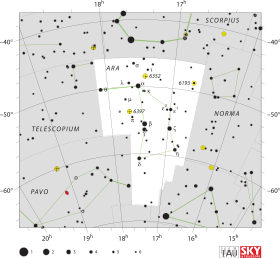Delta Arae
| Ascension droite | 17h 31m 05,91272s[1] |
|---|---|
| Déclinaison | −60° 41′ 01,8522″[1] |
| Constellation | Autel |
| Magnitude apparente | 3,62[2] |
Localisation dans la constellation : Autel | |
| Type spectral | B8 Vn[3] + G8 V[4] |
|---|---|
| Indice U-B | −0,31[2] |
| Indice B-V | −0,10[2] |
| Vitesse radiale | +10[5] km/s |
|---|---|
| Mouvement propre |
μα = –54,01[1] mas/a μδ = –99,25[1] mas/a |
| Parallaxe | 16,48 ± 0,34 mas[1] |
| Distance |
198 ± 4 al (61 ± 1 pc) |
| Masse | 3,56 M☉[6] |
|---|---|
| Rayon | 3,12 ± 0,15 R☉[7] |
| Gravité de surface (log g) | 3,81 ± 0,06[7] |
| Température | 11 962 ± 86 K[7] |
| Rotation | 255[4] km/s |
| Âge | 125 M a[8] |
Désignations
Delta Arae (δ Arae, δ Ara) est une étoile double de la constellation australe de l'Autel. Elle a une magnitude apparente de 3,62[2] et est donc visible à l'œil nu. Sur la base d'une parallaxe annuelle de 16,48 mas, elle est à environ 198 années-lumière de la Terre[1].
Delta Arae est une étoile massive de la séquence principale de type spectral de B8 Vn[3]. Le suffixe 'n' indique que les raies d'absorption sont fortement élargies car l'étoile tourne rapidement sur elle-même. Elle a une vitesse de rotation projetée de 255 km/s, créant un bourrelet équatorial avec un rayon 13% plus important que le rayon polaire[4]. Elle possède une compagne de magnitude 9,5 de la séquence principale de type G qui forme peut-être un système binaire avec Delta Arae[6].
Il y a également une double visuelle de 12e magnitude située à 47,4 arcsecondes avec un angle de position de 313°[8].
Étymologie
Delta Arae était appelée 龜三 (signifiant "la troisième (étoile) de Guī", la tortue) dans l'astronomie chinoise traditionnelle[10],[11].
Allen l'a appelée ainsi que ζ Arae Tseen Yin (天陰)[12]. Il a probablement confondu la constellation de l'Autel (Ara) avec celle du Bélier (Ari). Tseen Yin étant en réalité dans le Bélier[10],[11].
Références
- F. van Leeuwen, « Validation of the new Hipparcos reduction », Astronomy and Astrophysics, vol. 474, no 2, , p. 653–664 (DOI 10.1051/0004-6361:20078357, Bibcode 2007A&A...474..653V, arXiv 0708.1752)
- B. Nicolet, « Photoelectric photometric Catalogue of homogeneous measurements in the UBV System », Astronomy and Astrophysics Supplement Series, vol. 34, , p. 1–49 (Bibcode 1978A&AS...34....1N)
- Nancy Houk, Michigan catalogue of two-dimensional spectral types for the HD stars, vol. 1, Ann Arbor, Michigan, Dept. of Astronomy, University of Michigan, (Bibcode 1978mcts.book.....H)
- Gerard T. van Belle, « Interferometric observations of rapidly rotating stars », The Astronomy and Astrophysics Review, vol. 20, no 1, , p. 51 (DOI 10.1007/s00159-012-0051-2, Bibcode 2012A&ARv..20...51V, arXiv 1204.2572)
- D. S. Evans, « The Revision of the General Catalogue of Radial Velocities », dans Batten, Alan Henry; Heard, John Frederick, Determination of Radial Velocities and their Applications, Proceedings from IAU Symposium no. 30, University of Toronto, International Astronomical Union, june 20–24, 1966 (Bibcode 1967IAUS...30...57E)
- Ed J. Shaya et Rob P. Olling, « Very Wide Binaries and Other Comoving Stellar Companions: A Bayesian Analysis of the Hipparcos Catalogue », The Astrophysical Journal Supplement, vol. 192, no 1, , p. 2 (DOI 10.1088/0067-0049/192/1/2, Bibcode 2011ApJS..192....2S, arXiv 1007.0425)
- E. L. Fitzpatrick et D. Massa, « Determining the Physical Properties of the B Stars. II. Calibration of Synthetic Photometry », The Astronomical Journal, vol. 129, no 3, , p. 1642–1662 (DOI 10.1086/427855, Bibcode 2005AJ....129.1642F, arXiv astro-ph/0412542)
- D. Ehrenreich, A.-M. Lagrange, G. Montagnier, G. Chauvin, F. Galland, J.-L. Beuzit et J. Rameau, « Deep infrared imaging of close companions to austral A- and F-type stars », Astronomy and Astrophysics, vol. 523, , A73 (DOI 10.1051/0004-6361/201014763, Bibcode 2010A&A...523A..73E, arXiv 1007.0002)
- (en) del Ara -- Star in double system sur la base de données Simbad du Centre de données astronomiques de Strasbourg.
- Chevalier, S., and Chevalier, S., (1911): "Catalogue d'Étoiles fixes, observés a Pékin sous l'Empereur Kien Long (Qianlong (Chien-Lung)), XVIIIe siecle", Annales de l'Observatoire Astronomique de Zô-Sé.
- (zh)伊世同 (Yi Shi Tong) (1981): 『中西対照恒星図表』科学出版社.
- R. H., Allen, Star Names: Their Lore and Meaning, New York, NY, Dover Publications Inc., (ISBN 0-486-21079-0), p. 64[1]
Lectures complémentaires
- 大崎正次 (1987): 「中国の星座・星名の同定一覧表」『中国の星座の歴史』 雄山閣出版, p. 312, 328.(ja)
Liens externes
- (en) Delta Arae sur la base de données Simbad du Centre de données astronomiques de Strasbourg.
- HR 6500
- (zh) AEEA (Activities of Exhibition and Education in Astronomy) 天文教育資訊網 2006 年 7 月 1 日

